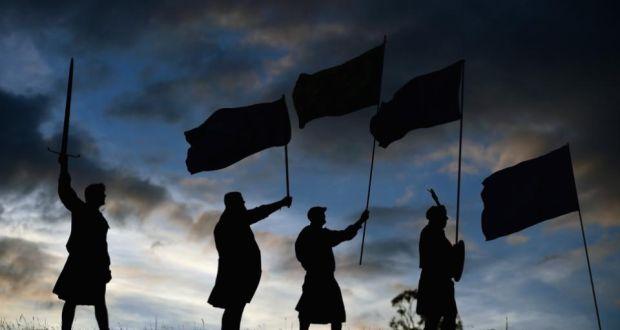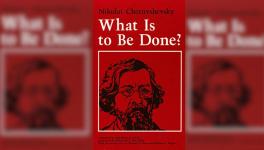Scottish referendum: Musings of a reluctant nationalist
The electorate has already sent a message: the current political settlement of strong oligarchies and weak democracies cannot stand.
I never thought I’d find myself defending nationalism. As a political ideology, the proposition that an Irish crook should be closer to me than an English saint holds little attraction. But if I had to choose between the civil and civic movement for independence in Scotland and the British and international elites who sneer at it as mere atavism, I know which side I prefer. There’s a very good case to be made against nationalism, but the technocratic elite dominating Europe is in no position to make it.
What’s the most extreme version of nationalism we’ve seen in the European Union in the last six years? It is the version promulgated by the European Central Bank. Faced with a Europe-wide banking crisis, at least partly created by EU policies (the poorly designed euro; the free movement of capital), European elites were quick to rediscover the centrality of the nationalism they had long derided.

Members of King of Scots Robert the Bruce Society, hold the Scottish flags as they prepare to vote in the Scottish independence referendum in Loch Lomond. “The Scots have already sent a message: the current political settlement of strong oligarchies and weak democracies cannot stand.” (Photo by Jeff J Mitchell/Getty Images)
Suddenly, the consequences of European policies were the responsibilities of nation states and their citizens. Anglo Irish Bank or Allied Irish Bank were no longer, as they had effectively become, European banks – they were 100 per guaranteed Irish. If – and this really happened – a British property company went bust having borrowed money from Anglo Irish, which in turn borrowed it from a Germany landesbank, who had to pay? Irish citizens who had no role in the transaction whatsoever. Why? Because Anglo was an Irish bank and Irishness was the central principle that trumped all others.
This has been the experience of a lot of European citizens in the last six years. We discovered in the most painful way that we were accountable for institutions that were not in any way accountable to us. We were found guilty on the basis of our nationality and punished accordingly. The hypocrisy is gross: nationalism is a silly and irrational anachronism except when it suits the elites for nationalism to be a fundamental and unalterable principle.
If those elites wanted to establish a powerful supra- national European identity they had a great opportunity to do so by making the banking crisis a shared European responsibility. Instead they were utterly determined to define it as a series of strictly national disasters, created – it was implied – by weaknesses in the national characters of the Greeks, the Irish, the Portuguese and the Spanish.
But surely nationalism is irrational? Indeed it is – and the current orthodox ideology is what? A paragon of evidence-based rationality? Or a brainless zombie politics that keeps going long after it has died? Neo-liberalism and its cult of free-flowing capital revealed its nakedness in the banking crash, but it lives on.
Failed austerity continues
The outsized, overweening global finance industry is back in business. Europe-wide austerity has failed spectacularly – but it continues. Evidence is irrelevant – these beliefs are sacred scripture.
There’s another layer of hypocrisy in this. So-called ordinary people are told they have disgraced themselves when they don’t vote. They’re called apathetic. But one of the interesting things about the Scottish referendum campaign is that apathy has been a big loser. The level of engagement has shown that people are not apathetic – they’re just sick of their votes making no difference to their lives.
Give them a chance to make a decision that just might make their future choices more meaningful and they grasp it. There are worse things than apathy – hateful and dangerous passions. But there are also better things than apathy and one of them may be people getting involved in peaceful and constructive arguments about who they are to call “we”, about what form of polity might give them the best chance of being able to affect the decisions that affect them.
That debate has already achieved something startling: it has killed the United Kingdom as we know it. If the Scots vote Yes on Thursday, the death will be sudden and shocking. But even if they vote No, it will be on the basis of the promise of greatly enhanced powers for a Scottish parliament – in effect the beginning of a radically altered federalised UK. A federal state will force huge changes in Britain – a written constitution, for example, and a federal second chamber at Westminster to replace the House of Lords. The political architecture of “these islands” is about to change radically and it will be Scots, by their engagement in the debate, who will have set that change in motion.
The Scots have already sent a message: the current political settlement of strong oligarchies and weak democracies cannot stand. People all over Europe will have to involve themselves in big fights – about equality, about accountability, about how to balance public needs and private demands. Nationalism may be one of the languages they speak but what matters is what they are using it to say.
Courtesy: irishtimes.com
Disclaimer: The views expressed here are the author's personal views, and do not necessarily represent the views of Newsclick
Get the latest reports & analysis with people's perspective on Protests, movements & deep analytical videos, discussions of the current affairs in your Telegram app. Subscribe to NewsClick's Telegram channel & get Real-Time updates on stories, as they get published on our website.
























